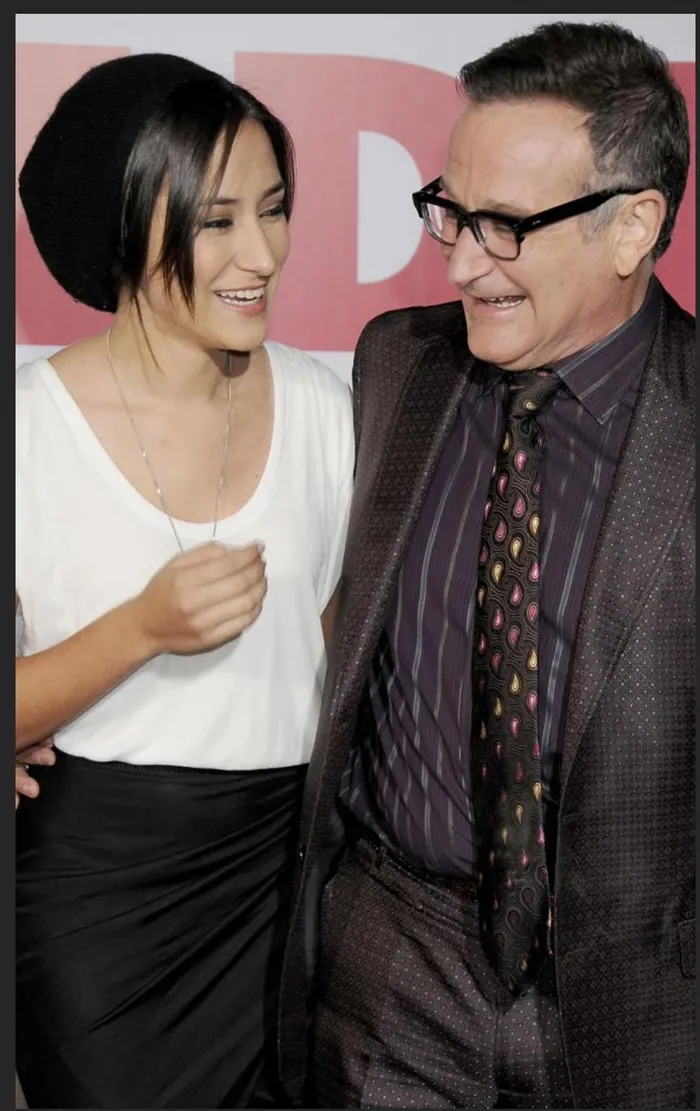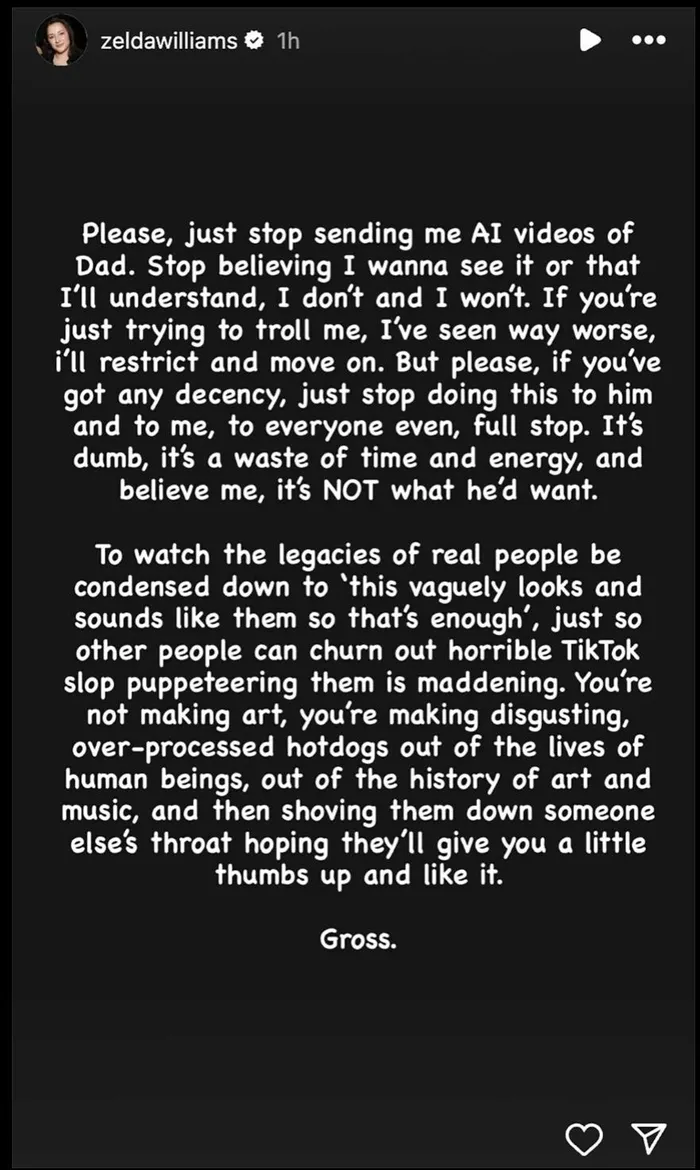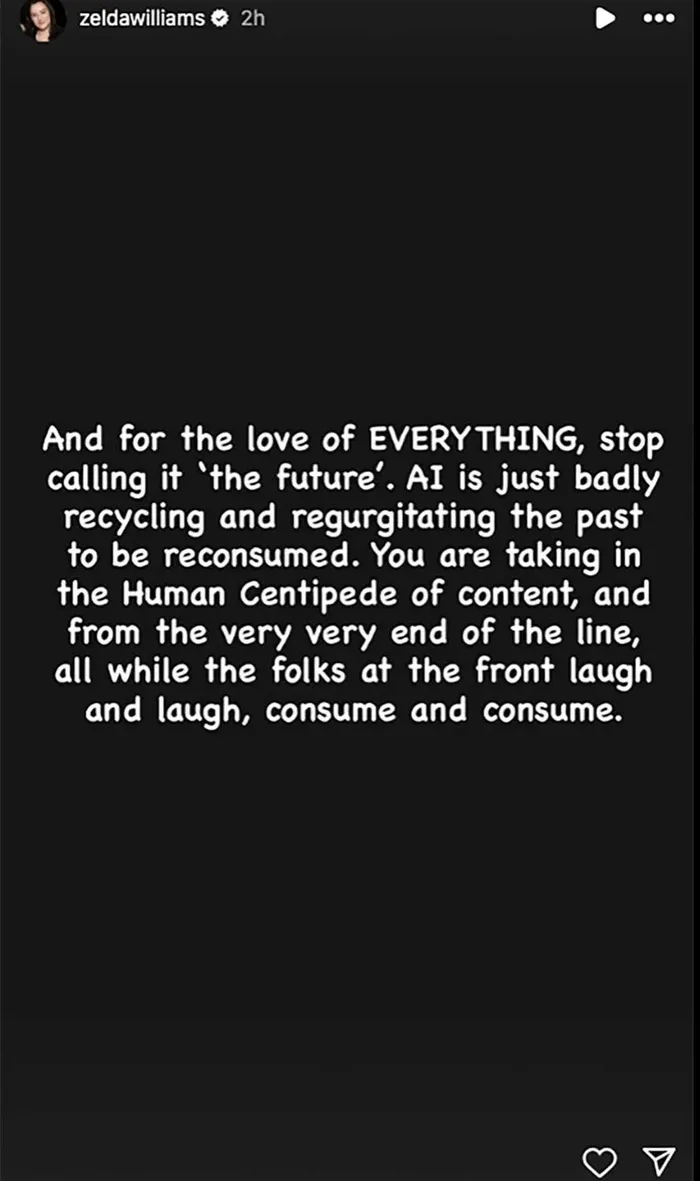
Zelda Williams daughter of late actor Robin Williams .
Image: Instagram
In a deeply personal and emotional plea, Zelda Williams, the daughter of the late comedic genius Robin Williams, has urged fans to stop sending her AI-generated videos of her father.
Eleven years after Robin’s tragic death at the age of 63, Zelda took to Instagram to express her frustration and heartbreak over what she perceives as a disrespectful and dehumanising trend.
Her message comes at a time when conversations about the ethical implications of artificial intelligence in entertainment and mental health are more relevant than ever.
A film-maker who most recently directed "Lisa Frankenstein", Zelda wrote passionately on her Instagram Story: "Stop believing I wanna see it or that I’ll understand, I don’t and I won’t. If you’ve got any decency, just stop doing this to him and to me, to everyone, even, full stop."
She continued, "To watch the legacies of real people be condensed down to ‘this vaguely looks and sounds like them, so that’s enough,’ just so other people can churn out horrible TikTok slop puppeteering them is maddening."

The resistance reflects growing fears that AI could replace human creativity, reduce job opportunities, and trivialise the unique qualities that make art meaningful.
Image: Instagram
The proliferation of AI-generated videos of her father isn't just an irritation; it’s a violation of Robin’s memory and humanity.
She described these creations as "disgusting, over-processed hotdogs out of the lives of human beings." Her words cut through the frivolity of AI novelty to underscore a deeper issue: the commodification of human emotion and legacy for fleeting digital attention.
Robin died by suicide on August 11, 2014, at age 63. At the time, the common narrative held that depression claimed him, but this narrative was incomplete.
An autopsy revealed a painful truth: he had diffuse Lewy body dementia (LBD), a neurodegenerative condition that often masquerades as Parkinson’s or a psychiatric disorder but includes hallucinations, confusion, tremors, sleep disturbances and mood changes.

AI is a tool, but how we choose to use it determines whether it’s beneficial or harmful.
Image: Instagram
His wife, Susan Schneider Williams, confirmed after his 2014 death that his autopsy revealed he had an unusually severe case of the condition, which caused symptoms including paranoia, anxiety, and confusion, leading to his struggle with the disease before he took his own life, according to "StatNews".
As the world observes World Mental Health Day on October 10, the message is simple, highlighting the fragility of mental health, even for someone as admired as the actor.
His death shocked fans worldwide and brought attention to the complexities of mental illness, particularly the devastating impact of neurological diseases like Lewy body dementia.
According to the World Health Organization (WHO), nearly one billion people globally live with a mental disorder.
Zelda’s frustration also taps into the growing concerns about AI’s role in the entertainment industry. The use of artificial intelligence to digitally recreate the likenesses and voices of deceased celebrities can blur the line between honouring a legacy and exploiting it for profit.
These recreations often feel impersonal and can cause distress to loved ones who see a version that lacks authenticity, raising questions about the emotional and ethical toll this technology takes.
AI is a tool, but how we choose to use it determines whether it’s beneficial or harmful. Exploiting someone’s likeness without consent, especially after their death, raises serious ethical questions about respect and agency.
According to "People", her critique also aligns with ongoing disputes in Hollywood. Recently, SAG-AFTRA and several high-profile actors criticised an AI talent studio for creating a computer-generated actress.
The resistance reflects growing fears that AI could replace human creativity, reduce job opportunities, and trivialise the unique qualities that make art meaningful.
Zelda's plea also underscores the importance of respecting grief. Grief is a deeply personal process, and constant reminders, especially in ways that feel artificial or exploitative, can hinder healing.
According to "E!", Zelda has candidly shared how fans' constant outpouring of tributes to her father, who shared Zelda and Cody Williams with Marsha Garces, as well as Zak Williams with Elayne Boosler, has impacted her grief journey.
"As I've said in the past, while I am constantly touched by all of your boundless continued love for him,” she wrote in August 2020.
“Some days it can feel a bit like being seen as a roadside memorial, a place, not a person, where people drive past and leave their sentiments to then go about their days comforted by their love for him."
There’s no denying the profound impact Robin had on the world. From his unforgettable roles in "Good Will Hunting", "Dead Poets Society" and "Mrs Doubtfire", to his ability to bring joy through comedy, his legacy is one of immense talent and heart.